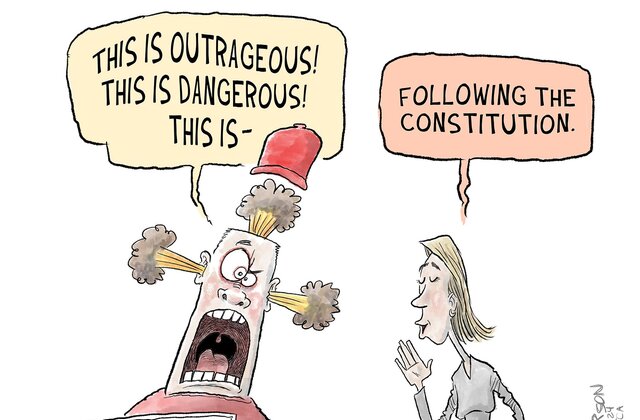[ad_1]
CAPE TOWN, South Africa (AP) — Barely two weeks after being released from prison in 1990, Nelson Mandela He went to Zambia to meet with African leaders who supported his fight against South Africa’s apartheid system of forced racial segregation.
A man stood among the crowd of people dressed in black suits waiting anxiously to welcome Mandela at the airport: Palestinian leader Yasser ArafatTraveled to see the recently freed Mandela, wearing his black and white checkered keffiyeh headdress.
He hugged Mandela and kissed each of his cheeks. Mandela smiled broadly. It was an affirmation of solidarity between two men who saw their people’s struggle for freedom as one in common.
South Africa is not a diplomatically powerful country and is geographically far from the conflict. But its ruling African National Congress, which Mandela led from an anti-apartheid liberation movement to a political party in government, has maintained its strong pro-Palestinian stance even after Mandela’s death in 2013.
political cartoon

“We stand with the Palestinians and we will continue to stand with our Palestinian brothers and sisters,” Mandela’s grandson, Mandla Mandela, said at a pro-Palestine rally in Cape Town in October, days after a Hamas attack in southern Israel. War on Gaza. ANC MLA Mandla Mandela wore a black and white Palestinian keffiyeh around his neck as he spoke to a large crowd.
Nelson Mandela regularly raised the plight of the Palestinians. Three years after apartheid and white minority rule in South Africa ended and Mandela was elected president in historic pan-racial elections in 1994, he thanked the international community for its help. He added, “But we know very well that our freedom is incomplete without the freedom of Palestinians.”
Mandela and subsequent South African leaders were compared Israel imposed sanctions on Palestinians The treatment of black South Africans during apartheid in Gaza and the West Bank, two issues fundamentally addressed to those who were oppressed in their homeland. Israel provided weapons systems to the apartheid government of South Africa and maintained covert military ties with it until the mid-1980s, even after it publicly condemned apartheid.
Even before the current war the ANC has consistently criticized Israel as an “apartheid state”. International rights groups have also accused Israel of committing the crime of apartheid against Palestinians and this “aligns strongly with South Africa”, said Thamsanqa Malusi, a South African. Human rights lawyer.
Malusi said that many people in the South African government had experienced apartheid oppression and that this may help explain his decision to file a case against Israel in the UN’s top court.
While Nobel Peace Prize-winning politician Mandela also reached out to Israel in an effort to promote a peaceful solution, anti-Israel rhetoric in South Africa has grown stronger over the years, sometimes seeping into everyday life. For example, the youth wing of the ANC pressured South African grocery store chains to drop Israeli products and threatened to close them down if they did not.
The Israeli attack on Gaza sparked renewed solidarity towards the Palestinian cause in South Africa. Thousands of people have marched in support of Gaza in Cape Town and Johannesburg, and buildings in the Cape Town neighborhood of Bo Kaap were decorated with pro-Palestinian graffiti in the weeks after the war began.
Cyril Ramaphosa, President of South Africa – is the current leader of the ANC. Criticized both Israel and Hamas What he calls atrocities committed by both sides in the conflict. But he also appeared in public wearing a keffiyeh and holding a Palestine flag, even as he expressed condolences to Israel over the October 7 Hamas attacks, leaving no doubt that South Africa’s sympathies where is.
ANC officials, including Mandla Mandela Hosted three Hamas officials in South Africa last month, which also included the group’s top representative in Iran. He took part in a ceremony marking the 10th anniversary of Nelson Mandela’s death in front of a statue of the former South African president at the seat of government, reaffirming his historic connection to the Palestinian cause.
On Wednesday, the eve of the court proceedings, Palestinians in the West Bank city of Ramallah crowded around another statue of Mandela, waving Palestinian and South African flags and holding signs that read: “Thank you South Africa ”
However, Hamas’s visit to South Africa was not welcomed by all.
South Africa’s main opposition party has said it considers Hamas a terrorist organization, like the United States and the European Union, and that support for the Palestinians in South Africa has complex racial connotations. Black and mixed-race South Africans, brutalized under apartheid, have been at the forefront of support for the Palestinians. Support among South Africa’s white minority is not as clear.
South Africa’s ANC-led government says it is taking a morale approach Genocide case against Israel, The first sought to order Israel to halt attacks in Gaza, which have killed more than 23,300 Palestinians, two-thirds of whom were women and children, according to the Gaza Health Ministry.
But the case has given rise to accusations of hypocrisy: the ANC itself has ignored the international court’s orders.
The ANC government refused to make the arrest. Former Sudanese President Omar al-Bashir He visited South Africa in 2015 while a warrant was issued by the separate International Criminal Court on genocide charges. South Africa has also maintained strong relations with Russia and President Vladimir Putin since its invasion of Ukraine. ICC indictment against Putin For alleged war crimes in relation to the abduction of children from Ukraine.
Copyright 2024 The associated Press, All rights reserved. This material may not be published, broadcast, rewritten, or redistributed.
[ad_2]
Source link
